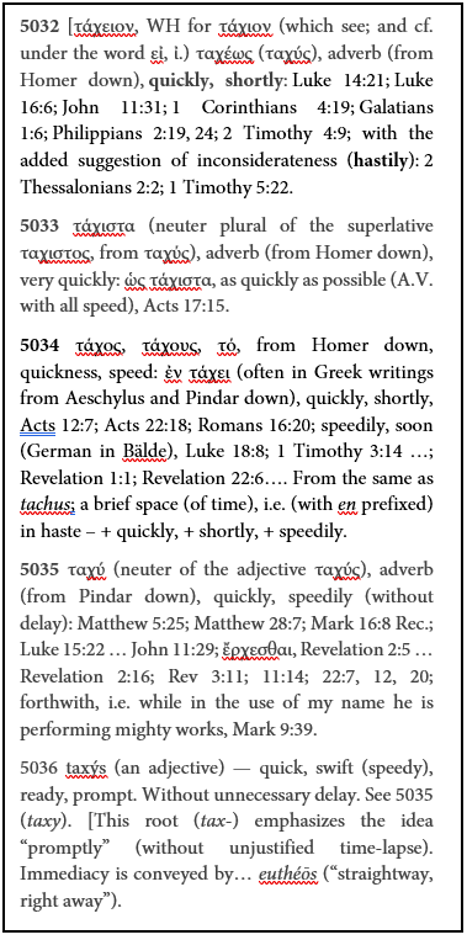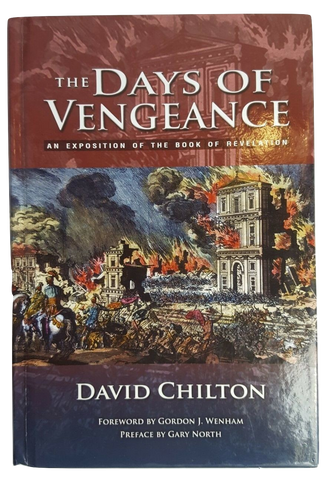Eschatology continues to be a hot button topic. In addition to the popular prophecy theorists who can’t help themselves from claiming the rapture is near, there are Facebook posters who add grist to the eschatology mill by critiquing arguments that are grounded on solid biblical study by people who should know better.
I saw the following post on Facebook post:
I sent my friend information related to [the Greek word] “tachos” and how often imminent time markers are used in Revelation. He sent me back a reply… See attached photo [reproduced by me below]. I would appreciate others’ thoughts and how I might answer if ok.
The image included lexical definitions of specific Greek words from Strong’s Concordance to support the belief that prophetic events were to take place, quickly, soon, and shortly as these words are generally understood. In response to the list of Greek words and their definitions, these comments were added to the chart:
“Does not mean ‘immediately’ or necessarily ‘in a very short time’ but rather ‘without any delay.’ His entire argument [using Strong’s definitions] relies on ‘soon’ carrying a connotation of ‘promptly’, shortly’, or even ‘immediately; or in ‘very short order’. Considering the above [see below] Greek meanings I cannot concur!”
It’s a mystery why he can’t concur since there is no other way to understand those words as Strong’s definitions as well as other lexical works show. See note 2.

A Beginner's Guide to Interpreting Bible Prophecy
For many Christians, interpreting Bible prophecy is a complicated task. As a result, they often turn to so-called Bible experts and complicated charts that include gaps in time, outrageous literal interpretations, and numerous claims that current events are prime indicators that the end is near. Many Christians are unaware that the same Bible passages have been used in nearly every generation as “proof” that the end or some aspect of the end (the “rapture”) would take place in their generation. They’ve all had one thing in common: They’ve all been wrong.
Buy NowBelow are the definitions from Strong’s Concordance that are found in the hard-to-read original “photo” mentioned above:

Here was my initial comment: “There is a simple response. Look up the non-eschatological passages where these words are found and see how they are used. I’ve done it, and they mean the same thing in both contexts.”
Here’s another example of someone trying to get around the consistently biblical way time texts are used in the New Testament, specifically the Greek phrase ἐν τάχει/en tachei:
A good translation of Revelation 1.1-3, “things (plural) which must take place with speed…for the time is now.” The adverbial. Presuppositional phrase en tachei (ἐν τάχει) is found in numerous places in Classical Greek literature, as well as in the LXX [the Greek translation of the Hebrew Old Testament]. As such the phrase modifies the action of the verb (“be”)—it speaks nothing of “time,” but of “action.” “The horses galloped en tachei.” “His sword was unsheathed en tachei.” Each of the “things” (plural) that must take place, will take place with speed, quickly, whenever they happen to take place. On this note, I stand firm with a great deal of Greek literature.
What if soldiers are about to enter a battle, and the commander says, “Unsheathe your swords quickly” because the battle is near? In context, the action is related to the time of the battle, and any soldier who does not act on the action “quickly” will most likely be cut to pieces.
Take note that the author of the above references Revelation 1:1-3. The phrase en tachei in verse 1 is coupled with “for the time is near” (ἐγγύς) in verse 3. They are related in time and action.
• The Revelation of Jesus Christ, which God gave Him to show to His bond-servants, the things which must soon take place; and He sent and communicated it by His angel to His bond-servant John (1:1).
• Blessed is the one who reads, and those who hear the words of the prophecy and keep the things which are written in it; for the time is near (1:3; also 22:10).
The things that must soon take place can’t be separated from the declaration that “the time is near,” that is, near for those to whom the Revelation (Ἀποκάλυψις[1]) was written. Specifically, to seven churches named and operating in the region at that time (Rev. 3). The use of “soon” and “near” fit the historical time and audience. If the time was “now”[2] for those who first received the Revelation, then whatever the action was for that audience was to happen “quickly” or “soon.” While the above writer argues that en tachei “speaks nothing of time” but only of “action,” the nearness of the prophesied events can’t be ignored. En tachei on its own may speak only of action, but the action revealed to John was to take place in terms of nearness. In fact, this is the way en tachei is used throughout the New Testament.
It’s puzzling that the above writer appeals to “Classical Greek” and the Septuagint but not to examples from the New Testament. Here are all the occurrences of ταχὺ and its cognates in the New Testament. You will note that in each case the “action” (soon or quickly) is coupled with “time” (near or at hand):
• Matthew 5:25: “Make friends quickly [ταχὺ] with your opponent at law while you are with him on the way, in order that your opponent may not deliver you to the judge, and the judge to the officer, and you be thrown into prison.
• Matthew 28:7-8: “And go quickly [ταχὺ] and tell His disciples that He has risen from the dead; and behold, He is going before you into Galilee, there you will see Him; behold, I have told you.” And they departed quickly [ταχὺ] from the tomb with fear and great joy and ran to report it to His disciples.
• Luke 15:22: “But the father said to his slaves, ‘Quickly [ταχὺ] bring out the best robe and put it on him and put a ring on his hand and sandals on his feet.’”
• Luke 16:6: “And he said, ‘A hundred measures of oil.’ And he said to him, ‘Take your bill, and sit down quickly [ταχέως] and write fifty.’”
• **John 11:29: “**And when she heard it, she arose quickly [ταχὺ], and was coming to Him.”
• **John 11:31: “**The Jews then who were with her in the house, and consoling her, when they saw that Mary rose up quickly [ταχέως] and went out, followed her, supposing that she was going to the tomb to weep there.”
• John 13:27: And after the morsel, Satan then entered into him. Jesus therefore said to him, “What you do, do quickly [τάχιον].”
• Acts 12:7: And behold, an angel of the Lord suddenly appeared, and a light shone in the cell; and he struck Peter’s side and roused him, saying, “Get up quickly [τάχει].” And his chains fell off his hands.
• Acts 22:18: and I saw Him saying to me, ‘Make haste [Σπεῦσον], and get out of Jerusalem quickly [τάχει], because they will not accept your testimony about Me.’
• **Acts 25:4: “**Festus then answered that Paul was being kept in custody at Caesarea and that he himself was about to leave shortly [ἐν τάχει].”
• Galatians 1:6: I am amazed that you are so quickly [ταχέω] deserting Him who called you by the grace of Christ, for a different gospel;
• Philippians 2:19: But I hope in the Lord Jesus to send Timothy to you shortly [ταχέως], so that I also may be encouraged when I learn of your condition.
• Philippians 2:24: and I trust in the Lord that I myself also shall be coming shortly [ταχέως].”
• 2 Thessalonians 2:2: that you may not be quickly [ταχέως] shaken from your composure or be disturbed either by a spirit or a message or a letter as if from us, to the effect that the day of the Lord has come.
• Revelation 1:1: The Revelation of Jesus Christ, which God gave Him to show to His bond-servants, the things which must shortly [ἐν τάχει] take place; and He sent and communicated it by His angel to His bond-servant John,
• Revelation 2:16: ‘Repent therefore; or else I am coming to you quickly [ταχύ], and I will make war against them with the sword of My mouth.
• Revelation 3:11: “‘I am coming quickly [ταχύ]; hold fast what you have, in order that no one take your crown.
• **Revelation 11:14: “**The second woe is past; behold, the third woe is coming quickly [ταχύ].”
• Revelation 22:6-7: And he said to me, “These words are faithful and true”; and the Lord, the God of the spirits of the prophets, sent His angel to show to His bond-servants the things which must shortly [ἐν τάχει] take place. “And behold, I am coming quickly [ταχύ]. Blessed is he who heeds the words of the prophecy of this book.”
• Revelation 22:12: “Behold, I am coming quickly [ταχύ], and My reward is with Me, to render to every man according to what he has done.
• Revelation 22:20: He who testifies to these things says, “Yes, I am coming quickly [ταχύ].” Amen. Come, Lord Jesus.
The following examples are from James Glasgow’s The Apocalypse: Translated and Expounded (1872).
VARIOUS INTIMATIONS OF A SPEEDY COMING OF CHRIST
WERE FULFILLED IN THE BEGINNING OF THE GOSPEL AGE[3]
These are expressed principally by the words ἐγγύς and ταχύ in the Revelation, and ἐγγίζω in the Gospels and Epistles. I shall exhibit a few examples: —
Matt. 3:2; 4:17; 10:7: “The kingdom of heaven is at hand” — ἤγγικεν.
Matt. 26:45: “The hour is at hand” — ἤγγικεν.
Mark 1:15; Luke 10:9, 11: “The kingdom of God is at hand” — ἤγγικεν.
Mark 14:42: “He that betrayeth me is at hand” — ἤγγικεν.
Luke 16:8: “The time draweth near” — ἤγγικεν
Luke 21:20: “The desolation thereof” (of Jerusalem)” is nigh” — ἤγγικεν.
Rom. 13:12: “The day is at hand”— ἤγγικεν.
Heb. 10:25: “Ye see the day approaching” — ἐγγίζουσαν.
James 5:8: “The coming of the Lord draweth nigh” — ἤγγικεν.
1 Pet. 4:7: “The end of all” (Πάντων — of the spiritually dead in the previous verse) “is at hand” — ἤγγικεν.
Matt. 26:18: “My time is at hand” — ἐγγύς.
Luke 21:31: “The kingdom of God is nigh at hand” — ἐγγύς.
Phil. 4:5: “The Lord is at hand” — ἐγγύς.
Rev. 1:3; 22:10: “The time is at hand” — ἐγγύς.
The examples now given relate principally to time; but the words in more than forty instances refer to place and denote immediate contiguity.
So ταχύ and cognates may be exemplified:
Luke 14:21: “Go out quickly into the streets” — ταχέως.
Luke 16:6: “Sit down quickly” — ταχέως.
John 11:31: “She rose up hastily [quickly]” — ταχέως.
1 Cor. 4:19: “I will come to you shortly.” — ταχέως
2 Thess. 2:2: “That ye be not soon (ταχέως) shaken” — ταχέως.
2 Pet. 1:14: “Shortly (ταχινή) I must put off this tabernacle.”
John 13:27: “That thou doest, do quickly” — τάχιον.
Acts 12:7: “Rise up quickly” — ἐν τάχει.
Rom. 16:20: “God shall bruise Satan under your feet shortly” — ἐν τάχει.
Matt. 28:7: “Go quickly (ταχύ) and tell His disciples.” — ἐν τάχει.
John 11:29: “She rose quickly” — ταχύ.
Rev. 1:1; 22:6: “Things which must shortly come to pass” — ἐν τάχει.
Rev. 2:16: “I will come to Pergamos quickly” — ταχύ — in the Neronian persecution.
Rev. 3:11: “I come quickly” — ταχύ: viz. on Jerusalem.
Rev. 11:14: “The third woe cometh quickly” — ταχύ — in three and a half years.
Rev. 22:7, 12, 20: “I come quickly” — ταχύ.
Don’t be fooled by attempts to obscure the obvious by those who appeal to Classical Greek literature and the Septuagint that most people can’t access. What we do have is the text of the New Testament that is very clear on this topic. The study aids are also relatively available to anyone wanting to search the Scriptures to determine if these things are so (Acts 17:11).

The Days of Vengeance
David Chilton's extraordinary verse-by-verse exposition of Revelation is as welcome as a cool drenching rain upon a dry, thirsty ground. From the very beginning, cranks and crackpots have attempted to use Revelation to advocate some new twist on the Chicken Little Doctrine: "The Sky is Falling!" But, as David Chilton shows in this careful, detailed exposition, St. John's Apocalypse teaches instead that Christians will overcome all opposition through the work of Jesus Christ.
Buy Now[1] An unveiling, uncovering, revealing.
[2] The Greek word for “now” (νῦν) is not used in Revelation 1:3. It’s the Greek word engus (ἐγγύς) most often translated as “at hand” formed from two Greek words: en (“at” or “in”) and guion (“limb, hand”). The meaning is literally at hand,” not two millennia in the future. Arndt and Gingrich’s A Greek-English Lexicon of the New Testament and Other Early Christian Literature states that meaning is “near.” Thayer states that it refers to “of Time; concerning things imminent and soon to come to pass: Matthew 24:32; Matthew 26:18; Mark 13:28; Luke 21:30, 31; John 2:13; John 6:4; John 7:2; John 11:55; Revelation 1:3; Revelation 22:10; of the near advent of persons: ὁ κύριος ἐγγύς, of Christ’s return from heaven, Philippians 4:5 (in another sense, of God in Psalm 144:18; with the addition ἐπί θύραις, at the door, Matthew 24:33; Mark 13:29; ἐγγύς κατάρας, near to being cursed, Hebrews 6:8; ἀφανισμοῦ, soon to vanish, Hebrews 8:13.”
[3] James Glasgow, The Apocalypse: Translated and Expounded (Edinburgh: T&T Clark, 1872), 59-60.

